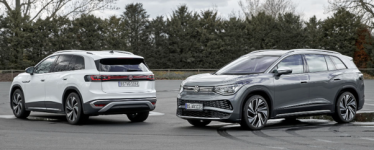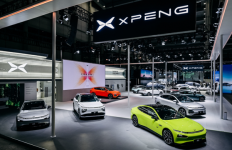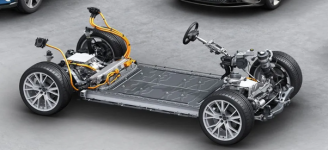If an Indian friend had posed this query
I can console you.
The difficulty of producing electric cars is so great that even European companies are struggling.
According to the news, Volkswagen is getting ready to sue and destroy an import dealer's ID6. This electric Volkswagen vehicle is made in China. Compared to the Volkswagen ID4, which is made in Europe, it is 30% less expensive, larger, has six seats, a greater range, and more configuration options. Volkswagen will no longer be able to sell the ID4, making it a joke once this vehicle is offered in Europe.
Found the problem? A product made by the same firm that is produced in China is better, more potent, and more affordable. It is so much better than its locally made European brothers, even after factoring in hundreds of kilometers of transportation costs.
You must comprehend the ID6's role in China if you believe it to be an excellent vehicle. According to a 2023 Chinese automotive media survey, Chinese consumers viewed ID6 as "old," "outdated," "no innovation," and "unable to envision any new technology."
In China, it is not at all popular.
It is a daunting task for European and Japanese auto manufacturers to produce an electric car that can compete with Chinese buyers.
1. For electric cars, new body and chassis designs are required.
Conventional cars have too many pointless gadgets and take up too much room. They cannot be compared to an entirely new design if they are converted straight into electric vehicles. It implies the elimination of all conventional design experience and accumulation.
2. An energy source
Chinese customers have extremely specific needs when it comes to battery longevity. Most cars now come with a 500-kilometer battery life as standard, and premium brands are working toward a 1,000-kilometer battery life. This implies that temperature management, battery integration, and lithium battery technology will require significant financial investment. And consume a lot of time.
3. Electric drive
Reducing energy usage also requires an excellent electric motor. Specialized rare earth permanent magnets, windings and rotors for precision motors, and advanced motor control systems and software are needed for this. It also takes a lot of time and money.
4. Battery replacement and charging.
The one-hour charging period has not pleased Chinese customers. In an emergency, they can go 200 kilometers in 10 minutes, and they want it finished in 30 minutes. This entails creating liquid-cooled charging piles, high-power charging equipment, and 800V full vehicle voltage solutions.
In a highway service region, the top businesses have constructed thousands of battery swap stations, enabling them to replace a fully charged automobile battery in five minutes.
5. Virtual Intelligence-Autonomous Transportation.
They want greater and more sophisticated self-driving than Tesla because they find Tesla's self-driving system to be highly intriguing. On every road, in any weather, they want to be able to drive themselves. Thus, creating affordable lidar and creating sophisticated algorithms are needed for this.
It is hoped that the automobile would find a parking spot on its own once it gets to the mall and the owner gets out. and when it's time to go, instinctively head toward the door to retrieve its owner.
6. Digital cockpit
7. A range of opulent devices
8. Affordable, less expensive
Their demands are increasing, but Chinese businesses have met them, and these have come to represent China's electric car industry. However, this has caused major issues for rivals.
Currently, with the exception of Tesla, all foreign brand electric vehicles are considered “substandard” in China. Furthermore, because they are moving too slowly forward, Tesla's halo is vanishing soon.
China has long been planning and creating electric vehicles across a range of industries, and 10 years ago, they made significant investments. Europeans are currently attempting to overtake their Chinese counterparts. In an attempt to get on board the Chinese industrial train, businesses like Volkswagen, BMW, and Stellantis are either buying platforms and technologies from their Chinese competitors or making significant investments in Chinese start-ups. The reactionary Japanese corporations are still dreaming about "hydrogen energy" and have not even begun.
Going back to the original query: What keeps Indian businesses from manufacturing their own electric vehicles?
To put it plainly, you will inevitably fail if you don't plan ahead and don't prepare for anything.
I can console you.
The difficulty of producing electric cars is so great that even European companies are struggling.
According to the news, Volkswagen is getting ready to sue and destroy an import dealer's ID6. This electric Volkswagen vehicle is made in China. Compared to the Volkswagen ID4, which is made in Europe, it is 30% less expensive, larger, has six seats, a greater range, and more configuration options. Volkswagen will no longer be able to sell the ID4, making it a joke once this vehicle is offered in Europe.
Found the problem? A product made by the same firm that is produced in China is better, more potent, and more affordable. It is so much better than its locally made European brothers, even after factoring in hundreds of kilometers of transportation costs.
You must comprehend the ID6's role in China if you believe it to be an excellent vehicle. According to a 2023 Chinese automotive media survey, Chinese consumers viewed ID6 as "old," "outdated," "no innovation," and "unable to envision any new technology."
In China, it is not at all popular.
It is a daunting task for European and Japanese auto manufacturers to produce an electric car that can compete with Chinese buyers.
1. For electric cars, new body and chassis designs are required.
Conventional cars have too many pointless gadgets and take up too much room. They cannot be compared to an entirely new design if they are converted straight into electric vehicles. It implies the elimination of all conventional design experience and accumulation.
2. An energy source
Chinese customers have extremely specific needs when it comes to battery longevity. Most cars now come with a 500-kilometer battery life as standard, and premium brands are working toward a 1,000-kilometer battery life. This implies that temperature management, battery integration, and lithium battery technology will require significant financial investment. And consume a lot of time.
3. Electric drive
Reducing energy usage also requires an excellent electric motor. Specialized rare earth permanent magnets, windings and rotors for precision motors, and advanced motor control systems and software are needed for this. It also takes a lot of time and money.
4. Battery replacement and charging.
The one-hour charging period has not pleased Chinese customers. In an emergency, they can go 200 kilometers in 10 minutes, and they want it finished in 30 minutes. This entails creating liquid-cooled charging piles, high-power charging equipment, and 800V full vehicle voltage solutions.
In a highway service region, the top businesses have constructed thousands of battery swap stations, enabling them to replace a fully charged automobile battery in five minutes.
5. Virtual Intelligence-Autonomous Transportation.
They want greater and more sophisticated self-driving than Tesla because they find Tesla's self-driving system to be highly intriguing. On every road, in any weather, they want to be able to drive themselves. Thus, creating affordable lidar and creating sophisticated algorithms are needed for this.
It is hoped that the automobile would find a parking spot on its own once it gets to the mall and the owner gets out. and when it's time to go, instinctively head toward the door to retrieve its owner.
6. Digital cockpit
7. A range of opulent devices
8. Affordable, less expensive
Their demands are increasing, but Chinese businesses have met them, and these have come to represent China's electric car industry. However, this has caused major issues for rivals.
Currently, with the exception of Tesla, all foreign brand electric vehicles are considered “substandard” in China. Furthermore, because they are moving too slowly forward, Tesla's halo is vanishing soon.
China has long been planning and creating electric vehicles across a range of industries, and 10 years ago, they made significant investments. Europeans are currently attempting to overtake their Chinese counterparts. In an attempt to get on board the Chinese industrial train, businesses like Volkswagen, BMW, and Stellantis are either buying platforms and technologies from their Chinese competitors or making significant investments in Chinese start-ups. The reactionary Japanese corporations are still dreaming about "hydrogen energy" and have not even begun.
Going back to the original query: What keeps Indian businesses from manufacturing their own electric vehicles?
To put it plainly, you will inevitably fail if you don't plan ahead and don't prepare for anything.






